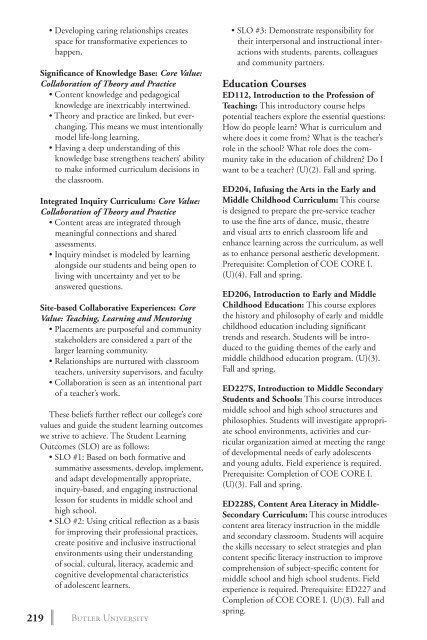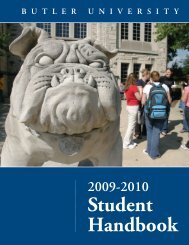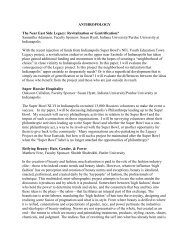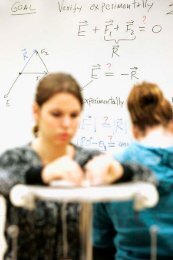2 0 1 3 bulletin - Butler University
2 0 1 3 bulletin - Butler University
2 0 1 3 bulletin - Butler University
You also want an ePaper? Increase the reach of your titles
YUMPU automatically turns print PDFs into web optimized ePapers that Google loves.
219<br />
• Developing caring relationships creates<br />
space for transformative experiences to<br />
happen.<br />
Significance of Knowledge Base: Core Value:<br />
Collaboration of Theory and Practice<br />
• Content knowledge and pedagogical<br />
knowledge are inextricably intertwined.<br />
• Theory and practice are linked, but everchanging.<br />
This means we must intentionally<br />
model life-long learning.<br />
• Having a deep understanding of this<br />
knowledge base strengthens teachers’ ability<br />
to make informed curriculum decisions in<br />
the classroom.<br />
Integrated Inquiry Curriculum: Core Value:<br />
Collaboration of Theory and Practice<br />
• Content areas are integrated through<br />
meaningful connections and shared<br />
assessments.<br />
• Inquiry mindset is modeled by learning<br />
alongside our students and being open to<br />
living with uncertainty and yet to be<br />
answered questions.<br />
Site-based Collaborative Experiences: Core<br />
Value: Teaching, Learning and Mentoring<br />
• Placements are purposeful and community<br />
stakeholders are considered a part of the<br />
larger learning community.<br />
• Relationships are nurtured with classroom<br />
teachers, university supervisors, and faculty<br />
• Collaboration is seen as an intentional part<br />
of a teacher’s work.<br />
These beliefs further reflect our college’s core<br />
values and guide the student learning outcomes<br />
we strive to achieve. The Student Learning<br />
Outcomes (SLO) are as follows:<br />
• SLO #1: Based on both formative and<br />
summative assessments, develop, implement,<br />
and adapt developmentally appropriate,<br />
inquiry-based, and engaging instructional<br />
lesson for students in middle school and<br />
high school.<br />
• SLO #2: Using critical reflection as a basis<br />
for improving their professional practices,<br />
create positive and inclusive instructional<br />
environments using their understanding<br />
of social, cultural, literacy, academic and<br />
cognitive developmental characteristics<br />
of adolescent learners.<br />
<strong>Butler</strong> <strong>University</strong><br />
• SLO #3: Demonstrate responsibility for<br />
their interpersonal and instructional interactions<br />
with students, parents, colleagues<br />
and community partners.<br />
Education Courses<br />
ED112, Introduction to the Profession of<br />
Teaching: This introductory course helps<br />
potential teachers explore the essential questions:<br />
How do people learn? What is curriculum and<br />
where does it come from? What is the teacher’s<br />
role in the school? What role does the community<br />
take in the education of children? Do I<br />
want to be a teacher? (U)(2). Fall and spring.<br />
ED204, Infusing the Arts in the Early and<br />
Middle Childhood Curriculum: This course<br />
is designed to prepare the pre-service teacher<br />
to use the fine arts of dance, music, theatre<br />
and visual arts to enrich classroom life and<br />
enhance learning across the curriculum, as well<br />
as to enhance personal aesthetic development.<br />
Prerequisite: Completion of COE CORE I.<br />
(U)(4). Fall and spring.<br />
ED206, Introduction to Early and Middle<br />
Childhood Education: This course explores<br />
the history and philosophy of early and middle<br />
childhood education including significant<br />
trends and research. Students will be introduced<br />
to the guiding themes of the early and<br />
middle childhood education program. (U)(3).<br />
Fall and spring.<br />
ED227S, Introduction to Middle Secondary<br />
Students and Schools: This course introduces<br />
middle school and high school structures and<br />
philosophies. Students will investigate appropriate<br />
school environments, activities and curricular<br />
organization aimed at meeting the range<br />
of developmental needs of early adolescents<br />
and young adults. Field experience is required.<br />
Prerequisite: Completion of COE CORE I.<br />
(U)(3). Fall and spring.<br />
ED228S, Content Area Literacy in Middle-<br />
Secondary Curriculum: This course introduces<br />
content area literacy instruction in the middle<br />
and secondary classroom. Students will acquire<br />
the skills necessary to select strategies and plan<br />
content specific literacy instruction to improve<br />
comprehension of subject-specific content for<br />
middle school and high school students. Field<br />
experience is required. Prerequisite: ED227 and<br />
Completion of COE CORE I. (U)(3). Fall and<br />
spring.
















